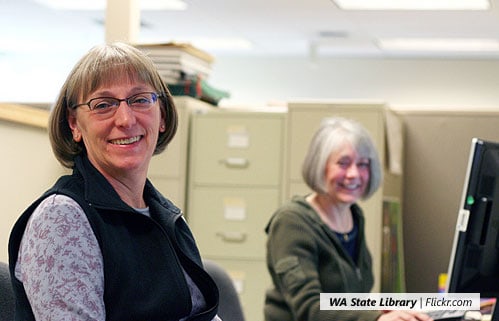
Volunteering
verb
“Freely offer to do something.”
“A person who performs a service willingly and without pay”
…Willingly and without pay…
I know what you’re thinking. Looking for a job is difficult. You try to take in all the information you can – any tip, any ‘system’ and any book. And when the words “willingly and without pay” appear together, it doesn’t appear relevant. But bear with me; this advice may be exactly the unconventional nugget you’ve been looking for.
Why Do We Volunteer?
Volunteering has been around for a long, long time. It’s in our very human nature. The concept is quite simple: in order to survive as a species, mutual self-help is a vital component of living in groups as humans do. Whether it’s begrudgingly volunteering your around-the-house fix-it skills for a neighbor or altruistically giving your time for a cause you believe in, the volunteering ethos has been passed down for generations.
When it comes to finding a job, however, volunteering isn’t as embraced.
When it comes to finding a job, however, volunteering isn’t as embraced. In our western society the lone ranger is idolized. One against the world, who perseveres against all adversaries, who achieves the familiar rags to riches story, dominates our thinking.
Volunteering comes down to helping others. We’re trained to help others and expect nothing in return. To a motivated job seeker this simply isn’t on the priority list. But it turns out that helping others can be one of the best ways a job seeker can help himself.
Cost-Benefit Your Actions
There’s more ways than ever for a job seeker to keep busy. Books, online resources, teachers, coaches, and the proliferation of social media have thrown endless amounts of information at us.
In an age of information overload, the intelligent job seeker must concentrate on the activities that will yield high returns while avoiding numerous low impact, time consuming dead ends.
Increasing your network and demonstrating to your new contacts your skills is a fantastic way to get ahead.
Volunteering can be a high-yield activity for a job seeker. But it must be done with purpose and for the right reasons.
The Benefits of Volunteering
Correctly approaching volunteerism in an intelligent way can yield marvelous effects for the job seeker. There are numerous benefits of volunteering.
Learn new skills
You can both improve current skills and learn new skills in a volunteer environment that’s different from your regular work environment. These skills can help you differentiate yourself among competition.
Improve your resume
Yes, you can (and should) include volunteer experience on your resume. Though I have received conflicting opinions from HR professionals interviewed on the true positive impact volunteer experience has, it is unanimous that it doesn’t hurt.
Network
The holy grail. This must be done strategically – please no collecting contacts and business cards like they’re stamps. Increasing your network and demonstrating to your new contacts your skills is a fantastic way to get ahead.
These are great benefits. But…
But with any commitment that takes a significant amount of time, the intelligent job seeker must compare the costs to the benefits. Mindlessly giving your time to a cause you don’t care about will get you nowhere. With all of the other activities you could be doing to increase hire-ability, volunteering must show positive expectation.
How do I find out if volunteering is right?
The following flow chart should give some guidance as to whether to volunteer or not. As you’ll see, the path to volunteering is more than the external benefits you receive. The answer to this question depends mainly on internal motivations, because without a clear, positive reason as to why you’re there, the impact you make will not be felt.
Check it out.

Volunteering Can Be Great. Is It Great For You?
What it all comes down to is this: volunteering is a fantastic way to learn new skills, meet key contacts and expand your network, show admirable qualities, add experience to your resume, and, let’s not forget, make a positive difference in the world.
Whether you decide to volunteer or not, the success you experience in life will be proportionate to the help you give.
As a job seeker, however, you must look at volunteering strategically. Finding a great job should be the most important thing to you. Every activity should seek to improve the chances that you’ll get hired to a great position.
Always keep an eye out for new positions. Check job sites like FreshGigs. Improve your social media presence. Learn new skills. And take a strong look at volunteering. Follow the flow chart to see if volunteering is the right fit for you.
Serve First. Reap Later.
Above all, create an attitude of service. Whether you decide to volunteer or not, the success you experience in life will be proportionate to the help you give. Focus on giving and the rewards you receive will dwarf all expectations.
Remember, we work best in groups. Give first; receive later.
Sources:
- http://www.nald.ca/library/research/heritage/compartne/pdfdocs/wrkplvoe.pdf
- http://www.unitedwaytoronto.com/volunteers/Work-Comm-volunteer.php
- http://www.energizeinc.com/hot/2004/04sep.html
- http://www.causecast.com/Portals/154453/docs/Causecast-Crowdfunding-Case-Study.pdf
- http://www.causecast.com/blog/bid/211476/Got-Corporate-Philanthropy
- http://www.causecast.com/blog/bid/249489/Better-Recruitment-Through-Philanthropy
- http://www.cep.ucsb.edu/topics/HumanGenerosity.htm
- http://www.causecast.com/blog/bid/166457/In-a-Tough-Economy-Pro-Bono-Volunteering-Takes-on-New-Importance
- http://www.askamanager.org/2009/04/can-volunteering-lead-to-job-offer.html